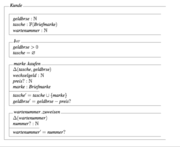- Object-Z
-
Z ist der Name einer Notation zur formalen Spezifikation von Software-Systemen und -Modulen.
Z basiert auf der Zermelo-Fraenkel-Mengenlehre und der Prädikatenlogik erster Stufe. Spezifikationen für komplexe Software-Systeme in Z werden durch die hierarchische Komposition von Schemata erreicht. Ein Schema besteht dabei aus einer Anzahl typisierter Variablen und Bedingungen, welche an die Belegungen der Variablen gestellt werden.
Z wurde von Jean-Raymond Abrial Ende der 70er Jahre geschaffen und durch die Programming Research Group im Oxford University Computing Laboratory weiterentwickelt. Im Jahr 2002 wurde Z durch die ISO (ISO 13568, [1]) standardisiert.
Inhaltsverzeichnis
Erweiterungen
Object-Z
Object-Z ist eine objektorientierte Erweiterung die an der University of Queensland, Australien entwickelt wurde. Sie erweitert Z durch Sprachkonstrukte die den objekt-orientierten Paradigmen ähneln. Im wesentlichen sind dies Klassen, Vererbung und Polymorphismus. Object-Z ist zwar nicht so populär wie Z selbst,doch es erhielt erhebliche Aufmerksamkeit von der formalen Spezifikations-Gemeinschaft. Untersuchungen über verschiedene Aspekte der Sprache erfolgen derzeit, einschließlich Hybrid-Sprachen, die Object-Z nutzen und diverse Tool-Unterstützungen (z.B. durch das Community Z-Tools-Projekt).
Z++
Z++ ist eine objektorientierte Erweiterung der Z-Notation.[1]
Literatur
- The Z Notation: A Reference Manual, 2. Ausgabe, von J.M. Spivey, 1992, Prentice-Hall International Series in Computer Science, ISBN 0-13-978529-9
- The Z Notation: A Reference Manual, 2. Ausgabe, von J.M. Spivey, 1992, Das Buch inklusive LaTeX Quelltext: http://spivey.oriel.ox.ac.uk/mike/zrm/
- Information Technology – Z Formal Specification Notation – Syntax, Type System and Semantics, ISO/IEC 13568:2002
- Z: An Introduction to Formal Methods, 2. Ausgabe, von A. Diller, 1996, John Wiley & Sons Ltd, ISBN 0-471-93973-0
- Object-Z: An object-oriented extension to Z., David A. Carrington, David Duke, Roger Duke, Paul King, Gordon A. Rose, and Graeme Smith. in S. Vuong, Formal Description Techniques II, FORTE'89, S. 281-296, North-Holland, 1990.
Weblinks
- http://vl.zuser.org/
- Community Z Tools
- CADiZ (Free Software Tools that assist the use of Z)
- Object-Z Webseite, University of Queensland, Australien
- Z User Meetings, International Conference of Z Users
Einzelnachweise
- ↑ Lano, Kevin, Z++, an Object-Oriented Extension to Z in Proceedings of the 5th Annual Z User Meeting, Oxford 1990, Workshops in Computing, Springer-Verlag 1991, S. 151–172, BibTeX-Eintrag bei DBLP
Wikimedia Foundation.

